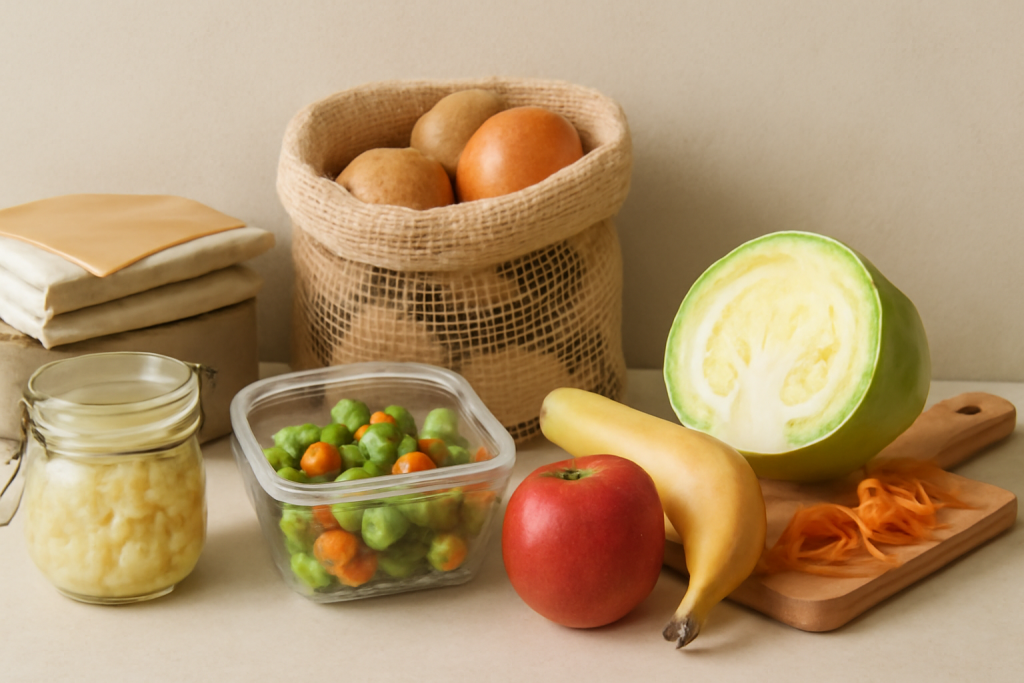Reducing food waste at home is not only beneficial for the environment but also for your wallet. With rising food prices and increasing awareness of sustainability, many households are seeking effective strategies to minimize waste. Here are some practical and emerging trends to help you reducing food waste at home.

1. Plan Your Meals and Shop Smart
Creating a weekly meal plan and shopping list can significantly reduce impulse purchases and overbuying. By knowing what you need, you can avoid buying items that may go unused and spoil. Additionally, checking your pantry and refrigerator before shopping helps in utilizing existing food items.thistle.co+4Mayo Clinic Press+4Wikipedia+4Wikipedia
2. Understand Food Labels
Misinterpretation of “best before” and “use by” dates often leads to unnecessary food disposal. “Best before” indicates quality, whereas “use by” refers to safety. Trust your senses—look, smell, and taste—before discarding food. This approach can prevent edible food from being wasted.Mayo Clinic Press+14…+14Wikipedia+14Shapiro+23Time+23World Economic Forum+23seeds.ca
3. Store Food Properly
Proper storage extends the shelf life of food. For instance, storing leafy greens with a paper towel in an airtight container can keep them fresh longer. Understanding the optimal storage conditions for different food items helps in maintaining their quality and reducing spoilage.Mom’s Kitchen Handbook+8The Times+8Food & Wine+8Mayo Clinic Press
4. Embrace Leftovers
Leftovers can be transformed into new meals. For example, roasted vegetables can be added to salads or blended into soups. Being creative with leftovers not only reduces waste but also saves time and money.Reddit+2Royal Carting Service Company+2…+2Better Homes & Gardens+2The Times+2Time+2
5. Utilize Food Scraps
Many food scraps are still valuable. Vegetable peels and stems can be used to make broth, and overripe fruits can be turned into smoothies or baked goods. Utilizing these parts in reducing food waste at home and maximizes the value of your groceries.
6. Compost Organic Waste
Composting is an effective way to recycle food scraps and organic waste. It not only reduces the amount of waste sent to landfills but also produces nutrient-rich soil for gardening. Various composting methods, including indoor bins and community programs, make it accessible for different living situations.The Guardian
7. Use Technology to Your Advantage
Several apps and technologies are designed to help reducing food waste at home. For instance, apps like Too Good To Go connect consumers with surplus food from local businesses at discounted prices. These tools can help you save money and prevent food from going to waste.The Scottish Sun+1Wikipedia+1
8. Educate and Involve the Household
Reducing food waste is a collective effort. Educate all household members about the importance of minimizing waste and involve them in meal planning and food storage practices. This shared responsibility fosters a sustainable mindset and ensures consistent practices.Vox+2Sunny Day Family+2Wikipedia+2
By implementing these strategies, it can significantly help in reducing food waste at home, leading to environmental benefits and cost savings. Small changes in daily habits can make a substantial impact over time.eatingwell.com
References:
- U.S. Environmental Protection Agency. (2025). Preventing Wasted Food At Home. Retrieved from https://www.epa.gov/recycle/preventing-wasted-food-homeUS EPA
- The Guardian. (2025, May 10). Don’t bin it, compost it: a beginner’s guide to smarter food waste. Retrieved from https://www.theguardian.com/australia-news/2025/may/10/dont-bin-it-compost-it-a-beginners-guide-to-smarter-food-wasteThe Guardian+1The Guardian+1
- World Economic Forum. (2025, April). 8 innovative solutions for fighting food waste. Retrieved from https://www.weforum.org/stories/2025/04/innovations-to-reduce-food-waste/World Economic Forum









